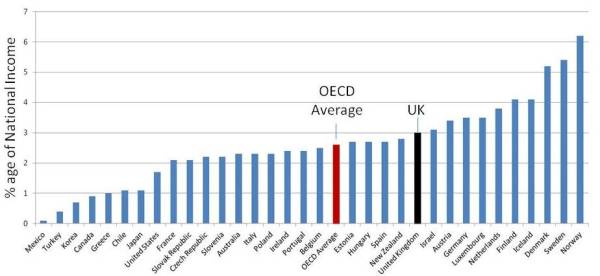It's fraud, Lord Freud.
Reblogged
from kittysjones:

Lord Freud on Disability Benefits: 27 words, 4
inaccuracies – a new record?
On
24 June Lord Freud stated to the House of Lords:
“I will set a little bit of context by saying that even in these hard
economic times this Government continue to spend around £50 billion a year on
disabled people and services to enable those who face the greatest barrier to
participate fully in society.
That figure compares well internationally. We spend almost double the OECD
average as a percentage of GDP – 2.4%against the OECD average of 1.3%. Only two
out of the 34 OECD countries spend more.” 1
The last paragraph should have said:
“That figure compares averagely internationally. We spend 1.16 OECD average
as a percentage of GDP—2.9% against the OECD average of 2.6%. Only 10 out of the
34 OECD countries spend more”
You have got to admire the consistency – the last 27 words contain four
statistics and four of them are wrong. When speaking about disability benefits
Government ministers have consistently abused numbers to make their case – but
four inaccuracies within 27 words is surely a record.
Basic numbers wrong
International comparisons of welfare systems can be tricky, but in this case
the flaws start long before we get to the difficult bits. The latest OECD
numbers on welfare spending are from 2009 pre-dating the Government and its
Welfare Reform package. 2.4% of GDP is NOT £50 billion. It was not £50 billion
in 2009 or any year to date, or for that matter any year forecast by the OBR,
2.4% of GDP is actually around £35 billion.
The most basic check of the data – verifying that the percentages match up
with the actual spending numbers – fails. Any competent statistician would smell
a rat and go back and check the numbers. Going back to the numbers shows that
£50 billion is a reasonable approximation of what the UK spends on people with
disability, but the OECD numbers being used represent only a subset of what is
spent on disabled people. It is also the only subset of spending on the disabled
which could make the UK system look so generous in an international
comparison.
Comparing Countries
Countries arrange their support for disabled people in different ways. A
meaningful comparison requires the groups helped to be defined consistently
across countries and that all the budgets that provide specific help to them be
included. For example some country’s welfare systems will buy you a wheelchair
and give you it, some countries will give you the money and you buy a
wheelchair. Broadly the same effect but the money comes from different budgets.
Most of these different ways of dividing up funding fall into the OECD
“incapacity related” data series.2

UK Disability spending compared to other OECD member states. Latest (2009)
data.
Using the correct measure of “incapacity related” spending the UK
figure is higher at 2.9% of GDP but it does much worse in the subsequent
international comparison (see the corrected quotation above). Importantly 2.9%
is close to the “around £50 billion” of spending that Lord Freud was talking
about, showing we are now comparing the right thing.
True, fair and competent
The corrected statement is not the unequivocal “truth” – no comparison is
perfect – but it does paint an informative picture of reality. The figures used
by Lord Freud do not – they may be defended as “true” but they are certainly not
a fair or informative representation of the real world.
It is important to note that although this all seems a bit technical these
issues are not new and people have been working competently with these data for
years. The EUROSTAT and OECD databases are specifically designed to aid people
getting these comparisons right.
Competence was not applied to this analysis either because none was
available but more likely because incompetence gave the answer that was wanted.
It is particularly worrying therefore that this inappropriate comparison has
been used in a Department of Work and Pensions publication.3
Inaccurate and damaging
The main argument made for reforming the disability benefits is that it is
“focusing them on those with most need”. This is a reasonable aim and there is
much debate as to if this will be the actual effect which is best discussed
elsewhere.
This real debate has been coloured by the Government’s choice to use
misleading and inaccurate statistics to paint many disability claimants as
cheats 4 and, as here, exaggerate the expense
and generosity of the system. This pollutes and undermines any reasonable debate
on the issue, as well as insults some of the most vulnerable people in our
society.
Footnotes
-
-
-

Many thanks to Robert Livingstone for his
excellent art work


